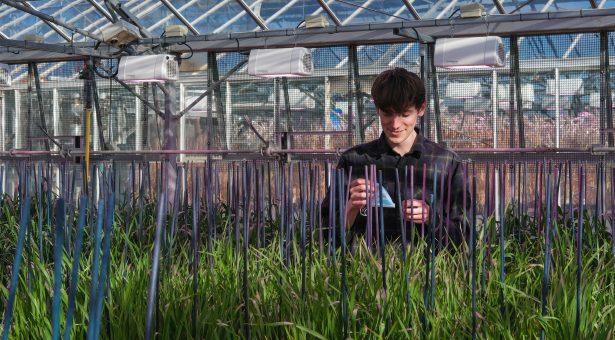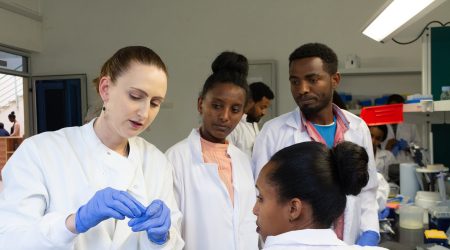PhD’s in a pandemic; Introducing new PhD Voice co-chair Josh Waites

Josh Waites in the new co-Chair of our PhD community; the PhD Voice.
We asked Josh, who co-chairs the JIC Student Voice with Emma Raven, about his own PhD project and how a global pandemic has affected the PhD community more broadly.
“I am a second-year PhD student working on a project aiming to increase the carotenoid content of wheat grains, as part of a collaboration between the lab of Professor Wendy Harwood and Dr Noam Chayut of the Germplasm Resource Unit.
Carotenoids play important roles for plants in photosynthesis, UV protection and hormone production, but they also play essential roles in human health.
Vitamin A deficiency can lead to health problems such as vision impairment and early childhood death. Several plant-made carotenoids are converted to Vitamin A by our bodies.
Many foods in diverse diets contain these carotenoids; however, Vitamin A deficiency remains a widespread problem for those relying on one or two staple crops low in carotenoid content such as wheat.
However, because of its widespread cultivation and consumption, wheat could act as an effective Vitamin A source and improve human health worldwide, if we can increase its carotenoid content.
Part of my project involves searching for new genes that increase carotenoid content in the existing natural variation within the large seedbanks (the Germplasm Resource Unit) here at the John Innes Centre.
Additionally, I aim to increase carotenoid content by using the new CRISPR/Cas9 genome editing methods now available to us. These involve changing a specific DNA sequence to improve a desirable characteristic of a crop.
Using CRISPR/Cas9 I will change a single DNA letter (nucleotide) in a gene involved in carotenoid production. This single nucleotide change mimics a DNA change that occurred in the same gene, but in melons. This change is responsible for an overaccumulation of carotenoids, producing this fruit’s orange-flesh.
The hope is that by introducing this edit in wheat, grains will accumulate more carotenoids. This would be similar to what happens in melons, to create wheat lines with modified, preferably higher, carotenoid content.
I am aware that my experiments might not turn out how I had hoped, and I might not get the results that I want. That doesn’t mean you have ‘failed’, because a PhD is all about learning how to carry out the scientific method, and learning how to be an independent researcher. Failed experiments are part of this process.
I didn’t grow up wanting to do a PhD; instead, my route into science was just me following things that I found interesting or enjoyed doing.
My interest in plants started when I was in primary school. I became fascinated with how bread is made from the seeds of plants that we grow in the ground – it seemed crazy to me. So, naturally, I forced my dad to photocopy a book on “How Bread is Made” that I had borrowed from the school library. Ultimately, I borrowed the book so often, they let me keep it.
In secondary school, I became interested in genetics and how evolution acts on genes.
I followed those interests by doing a Biology degree at the University of Bristol where I rediscovered my interest in plant science, and I became especially interested in wheat’s complex genetics.
From there my interest brought me to Norwich, where I joined the Plant Genetics and Crop Improvement Master’s course run by the John Innes Centre and the University of East Anglia.
I originally chose the John Innes Centre for my Master’s degree because I saw this as the place to be for UK plant science, due to the high concentration of plant scientists and groups here in Norwich. This means you can meet and talk to loads of people with similar scientific interests who work in different areas of plant science.
Additionally, the John Innes Centre has fantastic facilities available for carrying out plant and microbial research. This includes dedicated teams and platforms for microscopy and chemical analysis, as well as greenhouses and an incredible horticultural services team who work to look after your plants and experiments.
During my Master’s, I was also able to experience the PhD student community. This network of students is immensely helpful as in most cases we will all have the same PhD worries or anxieties, and we can support each other as we go through the same thing – or ask each other for help when doing a particularly tricky experiment.
It became clear to me that I enjoyed research and discovering new things and there was a community support network that would help me, so I just continued following the things I enjoyed, leading to a PhD.
The COVID-19 pandemic, and the lockdowns, has definitely made doing a PhD harder for everyone.
Not being able to come into the lab during the first lockdown really hit students in the middle of important experiments and those finishing up experiments at the end of their PhD.
We are fortunate that the institute rapidly became COVID secure, re-opening and staying “open” during the subsequent lockdowns. This means PhD students can choose to come in and continue experiments again, albeit with reduced access to certain facilities and reduced opportunities for supervision. I think the big problems COVID-19 has brought is pandemic stresses being added to PhD stresses and reduced opportunities to meet other students and support each other.
As the PhD Voice committee, we aim to address these problems by bringing people together virtually – especially focusing on new students who may not have had any opportunities to meet and interact with each other.
After my PhD, I know I want to stay in science as this is something that I love learning and talking about.
At the moment, I am really enjoying my research and I am considering doing a Postdoctoral position, but I know there are many post-PhD career choices out there, so I am keeping my options open.”
Josh is Co-Chair of the PhD voice with Emma Raven.



